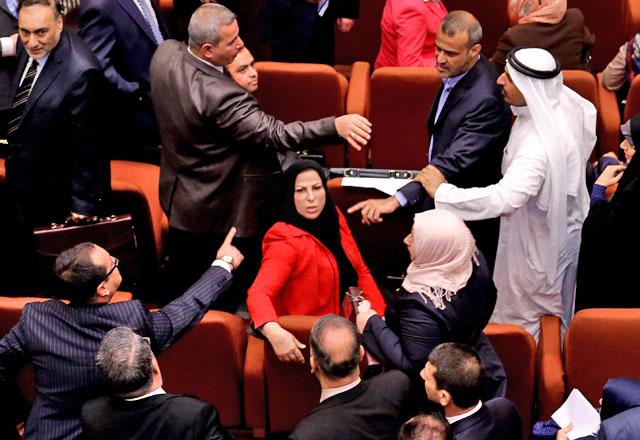You are here
Iraq MPs stall presidential vote as violence rages
By AFP - Jul 23,2014 - Last updated at Jul 23,2014
BAGHDAD — Iraqi lawmakers on Wednesday postponed choosing a new president for their ailing country while air strikes, suicide car bombs and summary executions yielded their daily grim crop of bodies.
Parliament adjourned without even broaching the issue and agreed to meet again on Thursday, their last chance to pick a new leader before the week-long Eid Al Fitr holiday.
A government air raid on the jihadist-held town of Sharqat, nearly 300 kilometres northwest of Baghdad, killed at least three women and a child, a senior army official told AFP.
Police and medical sources said another four people were killed in the strike, which destroyed the municipality building and a house in an area believed to shelter Islamic State (IS) fighters.
Also in Sharqat, IS gunmen killed a woman former candidate for parliament and wounded a women’s rights activist, tribal and military sources said.
Civilians have paid a heavy price for government air attacks on the IS, which conquered large swathes of Iraq’s west and north in a devastating offensive last month.
According to a Human Rights Watch report released on Wednesday but before the latest strike, at least 75 civilians have died in similar raids since June 6 in four cities, including Sharqat.
‘Awful toll’
“The government’s air strikes are wreaking an awful toll on ordinary residents,” HRW’s deputy Middle East director Joe Stork said in a statement.
The New York-based watchdog was particularly critical of the government targeting hospitals in militant-controlled areas and the use of barrel bombs on the rebel-held city of Fallujah.
Another government air strike Wednesday damaged a hospital complex in the main IS hub of Mosul, causing no casualties, a resident and a hospital worker told AFP.
The bodies of eight soldiers and allied militiamen executed on Tuesday were found just north of Samarra, a Sunni-dominated city home to one of Shiite Islam’s most important shrines.
In Jalawla in Diyala province, police and medics said IS executed four men because their brothers were policemen.
Despite the billions of dollars poured into training and equipment during the seven-year US occupation, Iraq’s million-strong army intially disintegrated when IS fighters attacked on June 9 and captured second city Mosul.
Eyewitnesses there said the Sunni jihadist group, which sees Shiites as heretics, blew up a Shiite shrine and Shiite prayer hall on Wednesday.
Jihadist cells have continued to wreak havoc in Baghdad also, with bombings mostly targeting the police.
The toll from a suicide car bomb blast at a police checkpoint guarding the entrance to Baghdad’s mainly Shiite neighbourhood of Kadhimiyah on Tuesday rose to 32, according to medical sources.
‘Dancing in blood’
Last month’s Sunni militant offensive led to the proclamation of a “caliphate” straddling Iraq and Syria by the IS, once an Al Qaeda offshoot that now appears to have outgrown the network founded by Osama Bin Laden.
The onslaught plunged Iraq into its worst crisis in years and exacerbated ethno-sectarian tensions that had already killed thousands this year alone.
Shiite Prime Minister Nouri Al Maliki has cast himself as a commander seeking to preserve Iraqi unity, but critics say his own brand of sectarian politics is partly to blame.
Many armed groups, religious and political leaders among the minority Sunni Arab community have sought to distance themselves from IS.
But some also see the offensive as protecting Sunnis from persecution by Shiite-dominated security forces and as their best chance to force Maliki from power.
Maliki, speaking on state television, accused some lawmakers of exploiting the chaos.
The problem, he said, was not IS, “but the politicians who play and dance in the blood and remains of Iraqis killed”.
The rebuke was a thinly veiled attack on Sunni politicians he sees as sympathetic to the IS, and to Kurds who used last month’s security vacuum to seize disputed towns and long-coveted oil fields.
Progress in renewing Iraq’s fractious government has been slow and halting.
Postponing the presidential vote, lawmakers spent Wednesday’s session discussing the 2014 national budget, almost eight months into the year, and eventually adjourned until Thursday.
Whoever succeeds the 80-year-old Jalal Talabani, who returned last week from 18 months of medical treatment in Germany to complete his tenure on home soil, will have limited powers.
But the person chosen could reveal what alliances have been formed in political horse-trading and give a hint of who could become the next premier.
Related Articles
BAGHDAD — Iraqi forces pressed Saturday their biggest offensive in months to resume their long-stalled northward advance and disrupt militan
SAMARRA, Iraq — At least 25 people were killed and 18 injured in Thursday's bomb attack on funerals for Iraqi fighters killed by extremists,
Iraq’s new parliament broke up in chaos Tuesday, with lawmakers threatening each other or walking out despite global calls for fractious politicians to form a government needed to face a Sunni militant onslaught.












